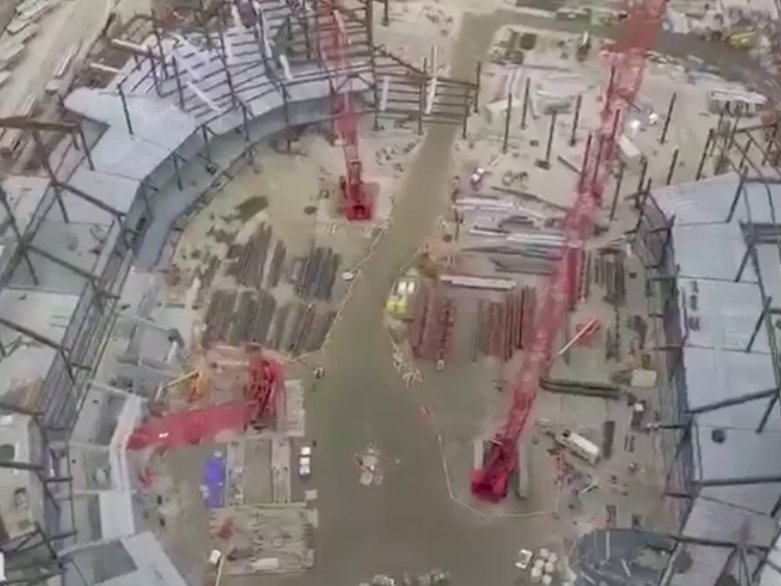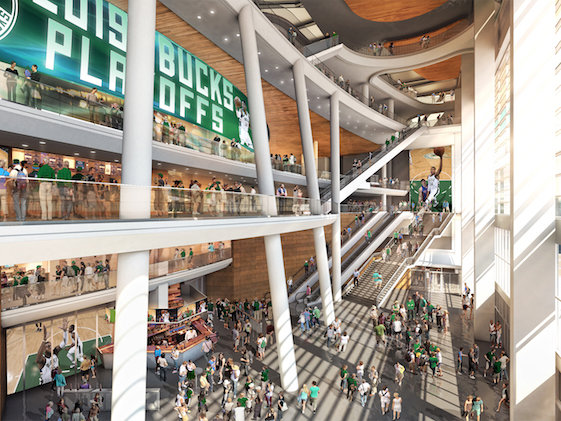The opinions expressed in this piece do not necessarily reflect the opinions of OnMilwaukee.com, its advertisers or editorial staff.
Just over one month ago Gov. Scott Walker, along with a coalition of legislative and business leaders, stood at a podium and announced the "Cheaper to Keep Them" plan to provide public funding to help build a new arena in Downtown Milwaukee.
Everybody walked around clapping each other on the back and the hallelujahs were almost overwhelming.
The plan was part of the budget bill that was in the process of being hacked up, massaged and worked through the powerful Joint Finance Committee.
Almost as soon as the plan was announced, it was in trouble. Tying the fate of the bill to the budget was a terrible problem and all kinds of forces aligned against it.
So, the legislative powers decided to take the plan out of the budget and move it forward as a separate piece of legislation. Anyone who thinks the measure stands a better chance of passing as its own measure is smoking some of that wacky weed.
The most important thing to every member of the state legislature is the biennial budget. It’s the one thing that brings things back to their districts. It’s the one thing that gives lawmakers something to run for and something to run against. Everybody cares about the budget.
I talked to a contact from Madison who is probably one of the most informed experts on how the legislature works and how people line up. He is totally non-partisan and has been watching things for over a quarter of a century. He asked not to be identified by name.
"Nobody cares about the Bucks thing," he said. "Well, not nobody, but not too many of these people really care that much about it. What they are all trying to avoid is any blowback from their constituents if they decide to vote for it. That’s what they care about more than anything."
He said that taking the measure out of the budget allowed lawmakers who favor the public funding for the new arena (Milwaukee Democrats and a couple of Republicans) to still vote against the budget. It also allowed lawmakers who are opposed to it (most of the rest of the legislature) to vote for the budget and not worry about facing that blowback.
One of the major problems of this plan has always been its complexity. It is built on four pillars: the State of Wisconsin, the City of Milwaukee, Milwaukee County and the Wisconsin Center District. If one of those pillars is shaky, the whole thing will collapse.
The Joint Finance Committee discussed the proposal Monday, with primary testimony from the Legislative Fiscal Bureau, answering questions from the JFC. It was obvious at the hearing that the lawmakers have many, many questions about the plan and that Democrats have their noses out of joint because they were left out of the development of the plan.
Senator Lena Taylor, who represents Milwaukee, called the plan "disgusting.
"I've been a fan of the Bucks all my life, but this issuing bonds by the Wisconsin Center District is nothing more than a sham. Nobody ever asked them about this and there is not revenue stream for these bonds to be paid for. And who makes a loan, as we are doing, and not ask them to pay anything back for 13 years? Who does that?"
Bucks' President Peter Feigin was blunt when he told lawmakers that if the Bucks don't have a "shovel in the ground by October or November, the NBA will wind up buying the team and moving it to Las Vegas or Seattle."
That is not to say that the public funding component of the new arena is dead. I still believe that it’s going to get done, somehow and somewhere.
Milwaukee Ald. Bob Bauman, who represents Downtown, used the approaching stalemate to renew his suggestion for the public funding.
"The plan I presented on April 16, 2015, 'The One Percent Solution,' involves a dedicated 1% Milwaukee County sales tax to fund 100% of the construction and maintenance costs of the new arena, fund the capital and operating costs of Milwaukee County parks and cultural institutions and fund the Milwaukee County share of capital and operating costs for the Milwaukee County Transit System," he said.
"This plan would reduce the Milwaukee County property tax levy by approximately $54 million, and would create a stable and predictable revenue stream for parks, cultural institutions and transit. This plan would eliminate the need for any state subsidy for the new arena and eliminate the extremely expensive borrowing by the Wisconsin Center District, permitting a continued discussion of the merits of convention center expansion. Finally, this plan would eliminate the ridiculous gimmick of the state buying the county’s bad debt which is nothing more than a disguised property tax subsidy to the Arena.
"This sales tax plan is honest and straightforward. The legislature could require a binding Milwaukee County referendum before this sales tax is implemented. While there will certainly be opposition to higher sales taxes, at least this plan addresses the need for new revenue directly."
Milwaukee County Executive Chris Abele is probably the one politician who is not handcuffed by being a locked-in ideologue. Abele is in love with pragmatic solutions and an expert at being willing to put the brakes on something that doesn’t work. He is all about cooperation and effectiveness. And he has a sensible approach to the building of the arena.
"This is a generational opportunity for us," he said during a recent interview at OnMilwaukee.com. "It is such a huge positive to me but what I’ve said is ... the questions you should ask every legislator is if you’re going to vote against this, how are you going to replace the hole in the state budget that you’ll be creating? The jobs that are there right now that you will lose immediately and how will the Park East, which not only will remain undeveloped, but will add to its undeveloped element a zombie Bradley Center, how is that going to make us any more attractive to development and what’s the message we’re sending?"
The message, if this gets turned down, is that Milwaukee is closed for business. No matter what the opponents say, if we lose this basketball team, the idea of having a vibrant city with a good tax base to pay for a variety of programs will be a pipe dream.
I still think this is going to come to pass, but the next week or so are going to be full of the gnashing of teeth and the sound of fingernails on the backboard.
With a history in Milwaukee stretching back decades, Dave tries to bring a unique perspective to his writing, whether it's sports, politics, theater or any other issue.
He's seen Milwaukee grow, suffer pangs of growth, strive for success and has been involved in many efforts to both shape and re-shape the city. He's a happy man, now that he's quit playing golf, and enjoys music, his children and grandchildren and the myriad of sports in this state. He loves great food and hates bullies and people who think they are smarter than everyone else.
This whole Internet thing continues to baffle him, but he's willing to play the game as long as OnMilwaukee.com keeps lending him a helping hand. He is constantly amazed that just a few dedicated people can provide so much news and information to a hungry public.
Despite some opinions to the contrary, Dave likes most stuff. But he is a skeptic who constantly wonders about the world around him. So many questions, so few answers.







